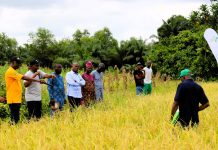
By Ugonma Cokey
This year, 6 countries in West Africa are going to the polls for parliamentary and presidential elections. They are Nigeria, Togo, Benin, Guinea, Ivory Coast and Burkina Faso. While some elections are in the first trimester with campaigns already underway, others will hold in the last trimester.
For Nigeria, which has already started campaigns, one issue that has featured in the campaigns are either achievements in agriculture or the opposition’s plans to feed the people when it comes into power. One wonders therefore if food should be a campaign issue or the people’s right.
In 1996, at the World food summit, governments reaffirmed the right to food and committed themselves to half the number of hungry and malnourished from 840 to 420 million by 2015.
Right to food
The right to food is a human right which protects the right for people to feed themselves in dignity, implying that sufficient food is available, that people have the means to access it, and that it adequately meets the individual’s dietary needs. This right derived from the International Covenant on Economic, Social and Cultural Rights which had 160 state parties as of May 2012, protects the right of all human beings to be free from hunger and malnutrition.
States that signed the covenant agreed to take steps to the maximum of their available resources to achieve progressively the full realization of the right to adequate food, both nationally and internationally. In a total of 106 countries the right to food is applicable either via constitutional arrangements of various forms or via direct applicability in law of various international treaties in which the right to food is protected.
The “right to adequate food” includes not only absence of malnutrition, but to the full range of qualities associated with food like, including safety, variety and dignity, and all elements needed to enable an active and healthy life.
Food Security and MDG Goal 7
It is no wonder then that one of the key issues discussed at the 24th African Union Summit which ended on Jan. 31 in Addis Ababa was food security within the broader of framework of development towards Agenda 2063 – an agenda that touches on many aspects of where Africa should be 50 years from now.
Ending hunger also featured prominently in the African Union’s activities in 2014. Not only did it declare 2014 as “African Year of Agriculture and Food Security”, but African heads of state and governments also adopted the Malabo Declaration on “Accelerated Agricultural Growth and Transformation for Shared Prosperity and Improved Livelihoods”.
To place the issue of land on the development agenda, FAO named 2015 as International Year of Soils within the framework of the Global Soil Partnership and in collaboration with the secretariat of the United Nations Convention to Combat Desertification aimed at increasing awareness and understanding of the importance of soil for food security and essential ecosystem functions, including climate change adaptation and mitigation.
In spite of concerted efforts by countries to attain Goal 7 of the Millennium Development Goals, MDGs framework which is (Achieving Environmental sustainability), Africa’s economies being among the world’s fastest growing economies. Statistics show that hundreds of millions of Africans live on or below the poverty line of 1.25 dollars a day, resulting in widespread hunger while one in three people in sub-Saharan Africa are malnourished.
Expectations
The expectations therefore is that intending and incumbent governments should be discussing how to put up enduring structures that would sustain food production, ensure food security and reduce hunger, rather than just promising food and re-bagging rice with the name of their political parties in a bid to lure people into voting them.’
To therefore ensure food security and put an end to hunger, the challenge of increasing global threat of climate change on arable land, the destruction of farmers’ harvests, drastic decline of biodiversity, preservation of ecosystems, use of biodegradables and eco-friendly products, has to be brought to the fore.
According to a new report, thousands of Nigerians are being kicked off their land in the North-eastern Taraba State for US-based food and agriculture company Dominion Farms, a new 300 square-kilometre rice plantation in the area.
The Environmental Rights Action/Friends of the Earth Nigeria (ERA/FoEN) has also cautioned the Edo State Government from going ahead with plans to allocate 410,000 hectares of forest land belonging to community people to corporations without the consent of locals who depend on the lands for their livelihoods.
To therefore achieve food security and protect the right of the common man to food, there has to be an end to direct and indirect land grabs, and politicians in Africa should take food out of their campaigns and strategize on how to actually protect their citizens’ right to food.




















